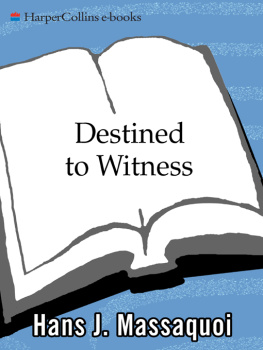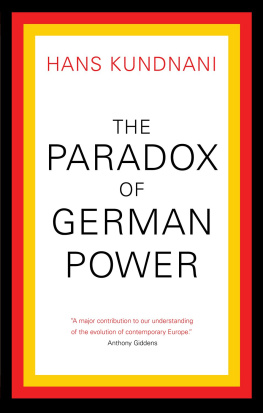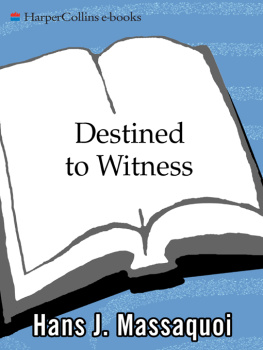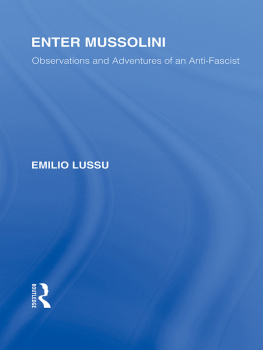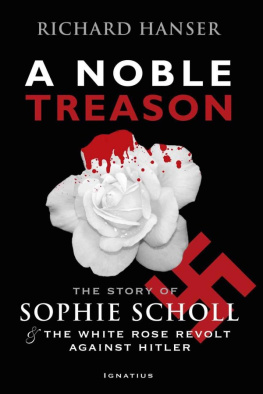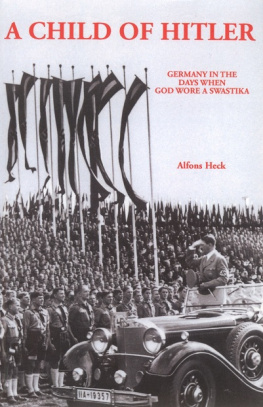HANS J. MASSAQUOI
To write of ones self, in such a manner as not to incur the imputation of weakness, vanity, and egotism, is a work within the ability of but few; and I have little reason to believe that I belong to that fortunate few .
FREDERICK DOUGLASS
I could not agree more with the above sentiments, expressed so eloquently over a century ago by the great abolitionist in the preface to his autobiography, My Bondage, My Freedom . If, like Mr. Douglass, I nonetheless decided to risk being thought of as weak, vain, and egocentric by making public the story of my life, it was mainly because of the persistent urging of persons whose literary judgment I felt was above reproach, such as my longtime friends Alex Haley, the author of Roots ; Ralph Giordano, of Cologne, Germany, author of Die Bertinis ; and my former employer and mentor, Ebony publisher John H. Johnson. Each convinced me that my experiences as a black youngster growing into manhood and surviving in Nazi Germanyan eyewitness to, and frequent victim of, both Nazi racial madness and Allied bombingsfollowed by my years in Africa were so unique that it was my duty as a journalist to share this rather different perspective on the Holocaust. Alex felt that because I was both an insider in Nazi Germany and, paradoxically, an endangered outsider, I had a rare perspective on some of the Third Reichs major catastrophic events. He also urged me to record my equally unique experience of finding my own African roots.
Four fundamental aspects set the private hell I endured under the Nazis apart from both the pogroms suffered by my Jewish compatriots in Germany and from the racial persecution inflicted on my African-American brothers and sisters in the United States.
As a black person in white Nazi Germany, I was highly visible and thus could neither run nor hide, to paraphrase my childhood idol Joe Louis.
Unlike African-Americans, I did not have the benefit of inherited survival techniques created and perfected by countless ancestors and passed down from generation to generation of oppressed people. Instead, I was forced to traverse a minefield of potential disasters and to develop my own instincts to tell me how best to survive physically and psychologically in a country consumed by racial arrogance and racial hatred and openly committed to the destruction of all non-Aryans.
Nazi racists, unlike their white American counterparts, did not commit their atrocities anonymously, disguised in white sheets and under the protection of night. Nor did they operate like some contemporary American politicians who advance their racist agendas by dividing black and white Americans with cleverly disguised code words about unfair quotas, reverse discrimination, and states rights. Racists in Nazi Germany did their dirty work openly and brazenly with the full protection, cooperation, and encouragement of the government, which had declared the pollution of Aryan blood with inferior non-Aryan blood the nations cardinal sin.
For all practical purposesexcept for the courageous and unflagging support I received from my German mother, who taught me to believe in myself by believing in me and my potentialI faced the constant threat that Nazi ethnic-cleansing policies posed to my safety alone. I faced this threat without the sense of security and feeling of belonging that humans derive from being members of a group, even an embattled one. Because of the absence of black females and the government-imposed taboo of race mixing, I had no legal social outlet when I reached puberty. Unlike the thousands of Africans and so-called brown babieschildren of black GI fathers and German motherswho reside in the Federal Republic of Germany today, there simply was no black population to speak of in Germany during the Hitler years, certainly none that I encountered. Not until long after the war did I learn that a small number of black Germansthe tragic so-called Rhineland bastards fathered by World War I French and Belgian colonial occupation troopswere exterminated in Hitlers death camps.
Because Germans of my generation were expected to be fair skinned and of Aryan stock, it became my lot in life to explain ad nauseam why someone who had a brown complexion and black, kinky hair spoke accent-free German and claimed Germany as his place of birth. So let me state here once again, for the record, that I was born in 1926 in Hamburg, Germanys second-largest city, because my grandfather, then consul general of Liberia to Hamburg, had brought with him his sizable family. His oldest son became my father after an intense courtship with my mother, a German nurse. Shortly before Hitlers rise to power, my grandfather and father returned to Liberia, leaving my mother and me to fend for ourselves in an increasingly hostile racist environment.
Our ordeal of living in constant fear of both Gestapo executioners and Allied bombs ended in the spring of 1945, when Karl Kaufmann, Hamburgs Nazi governor, surrendered the nearly destroyed city to the advancing British troops in defiance of Hitlers order to defend Hamburg to the last man. That which Studs Terkel in his oral history of World War II calls The Good War was everything but. It certainly was not for my mother and me, who narrowly escaped death in Hamburgs inferno after surviving some two hundred British and American air attacks, the killing of more than forty-one thousand civilians, and the destruction of more than half of the citys homes, including our own.
Three years after the war, in 1948, I joined my father in Liberia. While in Africa, I not only developed an appreciation for African culture, but also got my first taste of colonial racism, both French and British style. In 1950 I was admitted to the United States on a one-year student visa. Not quite nine months after my arrival, about a third of the way into the Korean conflict, I, a noncitizen, was ordered to report for military service due to an apparent clerical error, and served two years as a paratrooper in the 82nd Airborne Division.
There were numerous occasions, inside and outside the military, when I had the opportunity to see the ugly side of America, to sample U.S.-style racism and compare it with its Nazi counterpart. In one incident that clearly demonstrated that racism was not confined to the Jim Crow South, as is often alleged, I joined a march for open housing led by Dr. Martin Luther King Jr., in 1966 in Chicagos all-white Gage Park neighborhood. As Dr. King led our peaceful group in prayer, we were pelted with rocks and assaulted with profanities by an enraged white community barely held at bay by the thin ranks of police assigned to protect us.
In another incident, dressed in my army uniform, I was riding a train from Chicago to Fayetteville, North Carolina, on my way back to my post at Fort Bragg, when I was assaulted by a white train conductor after I had fallen asleep and missed moving to a segregated colored car when the Southbound train reached the Mason-Dixon Line. Get your black ass out of here and go where you niggers belong! the conductor, a shriveled white man, had screamed at me after kicking me from behind. Rather than risk being lynched for beating an old white man, as was my deep-felt inclination, I controlled my anger, picked up my duffel bag, and did as I had been told.
Such indignities were almost too much to bear, but I learned early in life that survival is the name of the game. My reward for having endured was the GI Bill, which enabled me to obtain the college education denied to me in Nazi Germany. Between studies, I managed to woo, win, and marry a young social worker from St. Louis. Although the marriage ended in divorce after fourteen years, it blessed us with two fine sons who provided much of the impetus for the modest success I have enjoyed.

